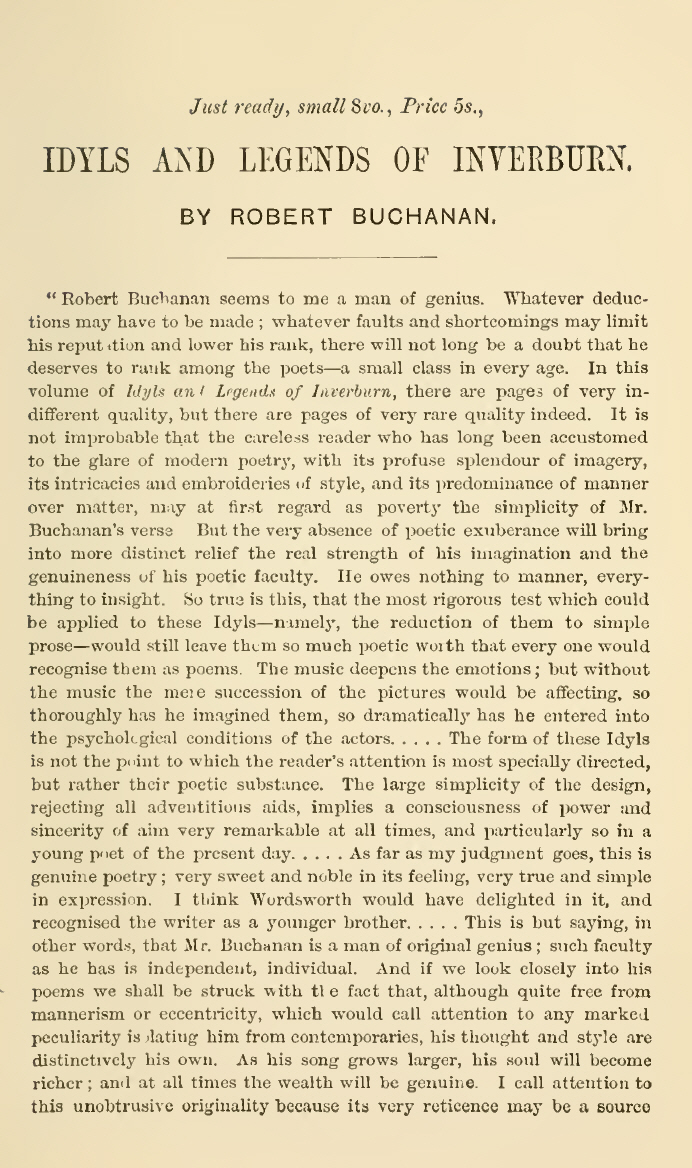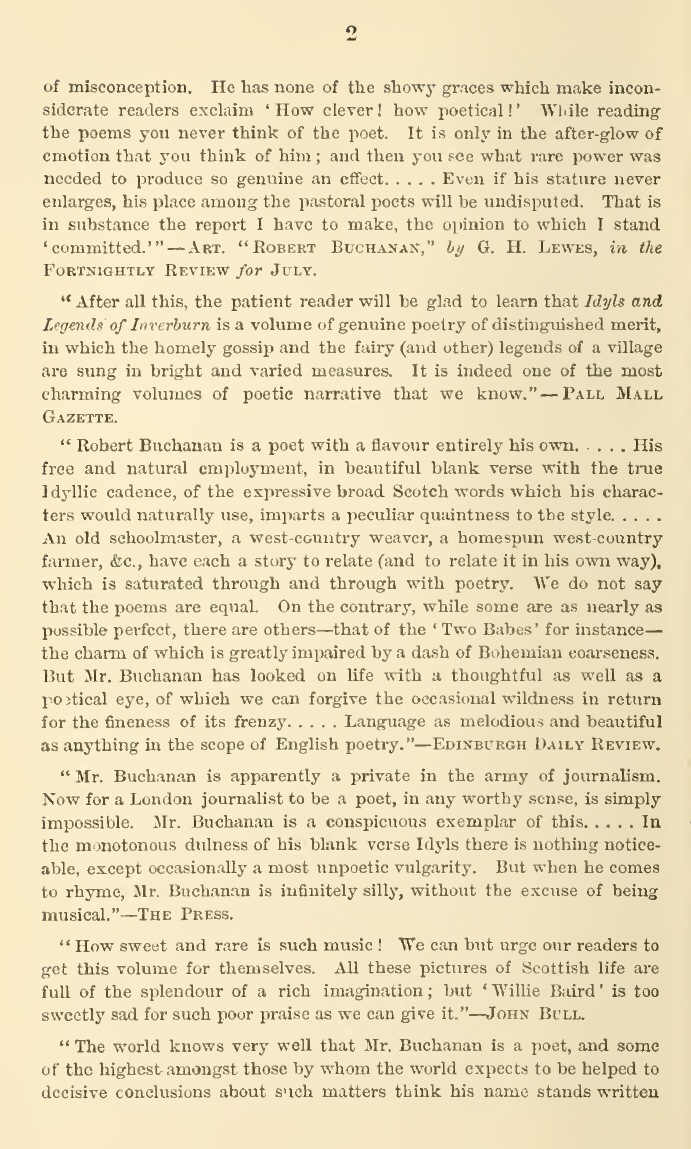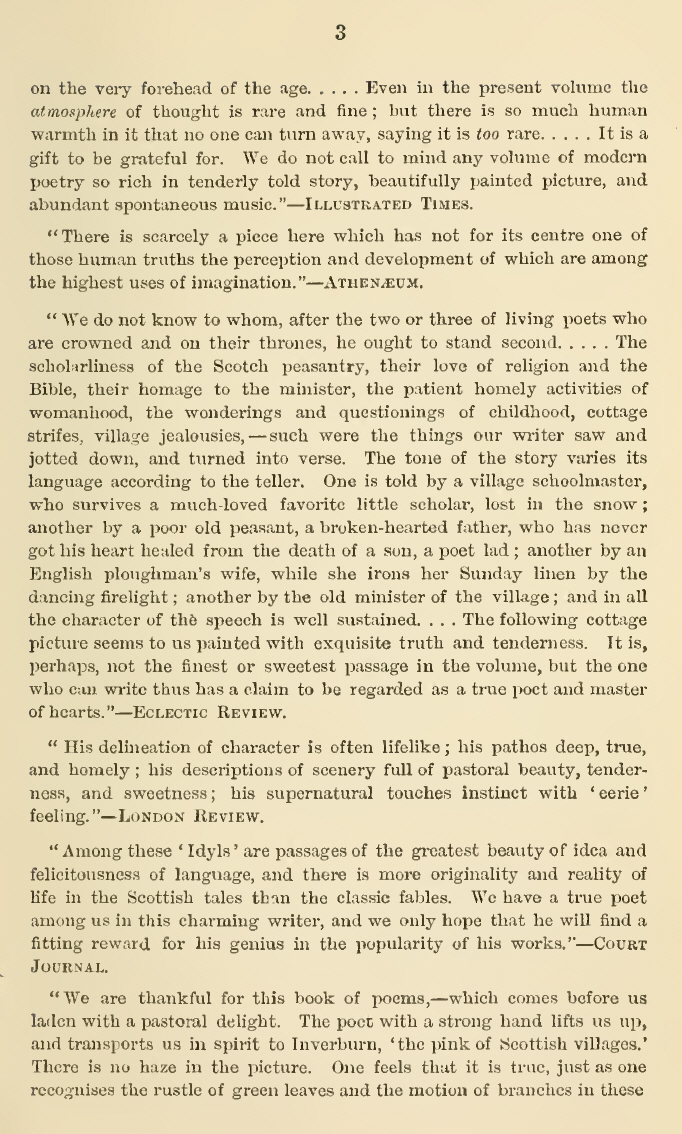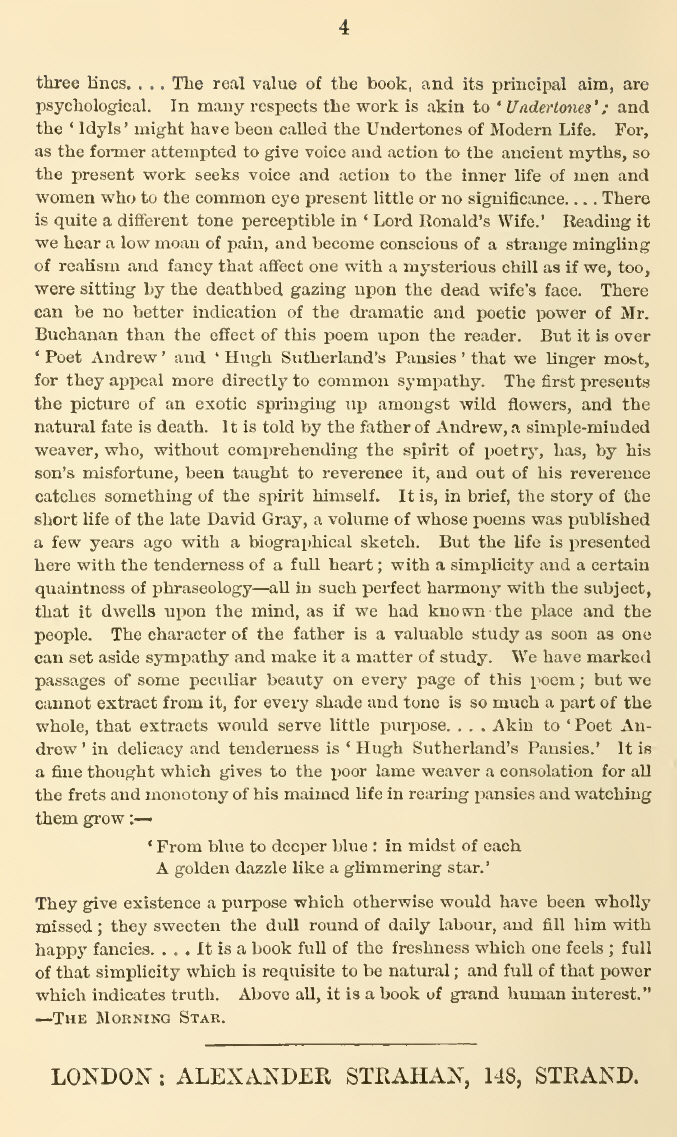ROBERT WILLIAMS BUCHANAN (1841 - 1901)
|
ROBERT WILLIAMS BUCHANAN (1841 - 1901) |
|
|
|
|
|
|
|
|
{Undertones 1863}
189 ANTONY IN ARMS. _____
LO, we are side by side!—One dark arm furls [1:1] And thro’ the chamber curtains, backward roll’d A bitter Roman vision floateth black Joy coming uninvoked, asleep, awake, Lo, how her dark arm holds me!—I am bound 191 [5:1] And then she loosens from me, trembling still Once more, O Rome! I would be son of thine—
[Notes:
193 FINE WEATHER ON THE DIGENTIA. _____
HORATIUS COGITABUNDUS.
1. FAVONIUS changes with sunny kisses
2. But what has a shaky quaky fellow,
3. Pleasant it is, I say, to sit here,
4. An idle life is the life for me,— 197 5. For, what is life?—or, rather ask here, [l.i]
6. Altogether, they puzzle me quite,
7. I, Quintus Horatius Flaccus, am learning
8. Bear witness, Flower!—One’s sense perceives
9. Take that bulky and truly delectable whole,
10. Humph, the grave!—not the pleasantest prospect, affirms,
11. Which reminds me, here, that the simile drawn
12. O Mutability, dread abstraction,
13. Yonder, yonder, the River doth run, * Golden lamps in a green night.—ANDREW MARVEL.
14. ’Tis absurd to tell me to ruffle a feather,
15. Ay, crop the corn with the crooked sickle, 211 16. Flash!
[Notes:
212 FINE WEATHER BY BAIAE. _____
VIRGIL TO HORACE.
1. SWEET is soft slumber, Horace, after toil,
2. Sweet ’tis to Cæsar, when the red star, grown 213 3. Sweet to Tibullus, sick and out of tune,
4. And further, sweetly comes a scroll from thee
5. Such alternation of unrest and rest, 214 6. The time-glass runs, the seasons come and go,
7. Shall merest mortal man with drowsy nod
8. Leave the grand mental war that mortals keep? 215 9. Nay, friend!—For such a man each hour supplies
10. Methinks I see thee sitting in the sun,
11. Unfaith is with thee, Horace. Sun and wind 216 12. O better far, if Man would climb, to range
13. Deep, deep, within Man’s elemental parts—
14. And thus we fashion with a piteous will 217 15. Woe, woe, to him, who craving that calm boon
16. My Horace!—I am here beside the deep,
17. Bluff March has blown his clarion out of tune, 218 18. For I am kneeling on the white sea-sand,
19. All is as still and beautiful as sleep:
20. This is the poetry of Heart’s repose, 219 21. What time I dream’d of this, the winds, cast free,
22. Within my blood arose the wild commotion,
23. And calm has come, and June is on the deep, 220 24. For hark! into my dream of golden ease
25. Ay, now, when all is placid as a star,
26. Unsatisfied, I hunger on the land, 221 27. Quiet, monotonous, breathless, almost drown’d,
28. The void within the calm for which I yearned,
29. Hear I the crawling movements of the main? 222 30. The sounds have mingled into some faint whole,
31. Ah, the monotonous music in my soul,
32. Is there a climbing element in life
[Notes:
223 THE SWAN-SONG OF APOLLO.
1. O LYRE! O Lyre! 224 2. Ah me! ah me!
3. Ah, woe! ah, woe!
4. O Lyre! O Lyre!
[Notes: A slightly revised version of ‘The Swan-Song Of Apollo’ with the title, ‘The Last Song Of Apollo’, was published in The Poetical Works Vol. I (London: H. S. King & Co., 1874).]
227
_____
TO MARY ON EARTH. __________
“Simplex munditiis!”
229 _____
TO MARY ON EARTH. __________
1. So! now the task is ended; and to-night,
2. First, sit beside me. Place your hand in mine.
3. My heart to-night is calm as peaceful dreams.— 231 4. Yet this is bitter. We were boy and boy, 232 5. Love gains in giving. What had I to give
6. No, Love, it is not bitter! Thoughts like those
7. I said, Love gains by giving. And to know
8. Most just is God: who bids me not be sad
9. This knowledge.—Better in your arms to rest,
10. Ay, all the thanks that I on earth can render
[Notes:
THE END.
BRADBURY AND EVANS, PRINTERS, WHITEFRIARS. |
 |
||||||
 |
||||||
 |
||||||
 |
||||||
|
Back to Undertones - Contents or Poetry
|
|
|
|
|
|
|